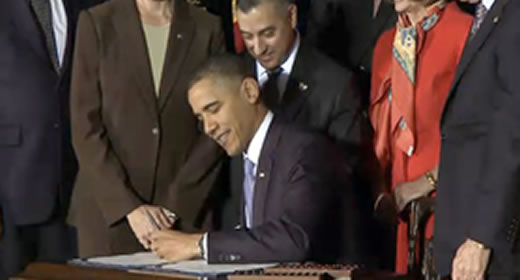
The national conversation about gay men and women serving in the military changed drastically this morning, when President Obama signed into law a bill repealing "Don't Ask, Don't Tell." The question no longer centers on the merits of allowing openly gay soldiers to serve, but rather how to prepare the nation's armed forces for those who do.
Ford School students, faculty and staff gained some insight into those issues from a panel of MPP students with military experience on Dec. 8, two weeks before the U.S. Senate's landmark vote for repeal.
"Is the military ready for it? Absolutely," said Adam Schmidt, a second-year MPP and West Point graduate who served as an Army company commander in Iraq. "Is it going to change in the way we train our leaders? Absolutely."
Schmidt and three first-year MPPs—Nathan Brown, Neal Carter and George Stankow—supported repeal of the controversial 1993 law, which allowed gay men and women to serve but prohibited them from disclosing their sexual orientation. More precisely, they shared a confidence in the military to adapt to any changes Congress decided to make about who can serve and the conditions therein.
"The military is not going to be any more ready in 24 months than it is now. We are not more ready now than we were 24 months ago," Schmidt said. "Implement the standard, provide the regulations and the institution will execute. It will not fail. It simply won't.
"The military will alter its operations, it will change its techniques, tactics and procedures and move forward and continue to be an outstanding military."
Ready for repeal?
None of the speakers felt unit cohesion would be affected by removing the policy, as some opponents of repeal have claimed. But they conceded that as commissioned officers, they had less contact with enlisted soldiers, amongst whom the reaction to openly gay soldiers undoubtedly will vary.
"I think there will be a few problems at the unit level because there's always going to be individuals who aren't comfortable with people who are different than them. That's just life," said Carter, a graduate of the Naval Academy who was a platoon commander in Afghanistan.
Brown countered that the senior leadership, generally more socially conservative than younger soldiers, may have an even tougher adjustment to make.
"I can't really see an issue with small-unit cohesion," said Brown, an artillery officer who started in the National Guard and made two tours in Iraq during his nine years of service. "There's going to be senior officials I think who have more of a problem with a change than at the unit level."
Schmidt emphasized the importance of the junior leadership ranks, such as company and platoon commanders in charge of 50 to 200 soldiers, in shaping the transition.
"Those low-level leaders are going to have to see what's happening on the ground, be it domestic, be it international or combat," Schmidt said. "It will not be pain-free, it will not be easy, it will not come without argument but I think over time we'll learn what we need do, and it will come from those junior leaders."
Not like the past
Stankow—a personnel and civil-affairs officer for 12 years who served in Iraq both with the Army and as a private contractor—pointed out the repeal of Don't Ask, Don't Tell is not akin to the admission of African-Americans and women to the U.S. military a generation ago. Today, gay and lesbian soldiers are already serving, and that may make the transition easier.
"I think we're going to have those kind of realizations where guys who never would have admitted to being comfortable serving with gay or lesbian soldiers, are suddenly going to realize they've been doing it all along and say, 'Hey, Johnny's one of the good ones,'" Stankow said.
Carter, the only African-American panelist, agreed.
"I think we'll start to see people start to change, the way it did in Korea and Vietnam when these black soldiers and sailors are pulling you out of a firefight," he said. "That's when people say, 'Ok, this guy's not that bad.'"
Out in Public, a LGBTQ and ally group at the Ford School, hosted the event, which drew a standing-room audience. Though Out in Public expressly supported repeal, that bias did not manifest itself in the discussion, to the relief of former Marine officer and first-year MPP student Sharif Sokkary.
"I thought they did a really good job of asking questions and letting the guys who had the military experience answer it," he said.
Sokkary did not consider the panel's unanimity to be a representative of all military personnel, but appreciated the remarks his comrades shared.
"First of all, they were entirely correct," he said. "Everything they said was absolutely right on, and they all had healthy perspectives on it, which is good. But to say it's representative of all perspectives isn't necessarily true."
Last May, Ford School Dean Susan M. Collins joined eight other policy school deans who signed a public letter to Congress calling for the repeal of "Don't Ask, Don't Tell".